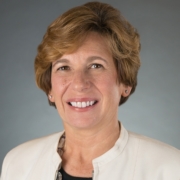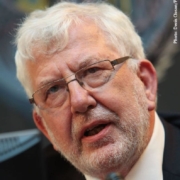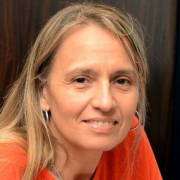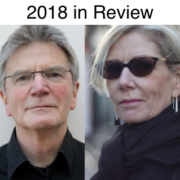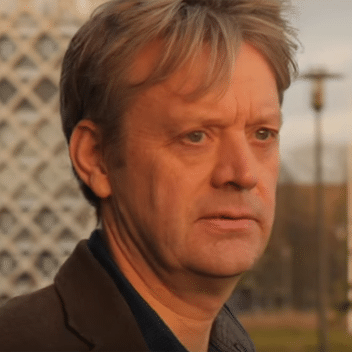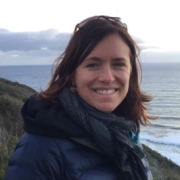Gia Destouni, Cecilia Burman & Will Brehm
Science Communication with Bakom Bokhyllan
Today FreshEd teams with the Swedish podcast Bakom Bokhyllan to explore science communication. Cecilia Burman, Gia Destoun, and Will Brehm discuss the benefits and challenges of communicating science to a public audience. By teaming up, FreshEd and Bakom Bokhyllan offer an example of the impact podcasts can have in higher education.
Cecilia Burman is a communication officer at Stockholm University Library and host and producer of the Bakom Bokhyllan. Gia Destoun is a Professor of Hydrology, Hydrogeology and Water Resources and Head of the Department of Physical Geography at Stockholm University. Will Brehm is an Associate Professor at the Institute of Education, University College London, and host of the FreshEd podcast.
Listen to the Bakom bokhyllan version!
Citation: Brehm, Will and Destouni, Gia interview with Cecilia Burman, FreshEd, 283, podcast audio, June 13, 2022.https://soundcloud.com/freshed-podcast/283-bakom-bokhyllan
Cecilia Burman 1:44
So, did I nail that presentation or what?
Will Brehm 1:46
You nailed it! Yes. It is a bit weird to be on the other side of this conversation. But thank you for stepping in and filling in just fine.
Cecilia Burman 1:54
Thank you. I hope I will do it justice. This is actually Bakom Bokhyllan’s first episode in English.
Will Brehm 2:03
Wow!
Cecilia Burman 2:04
But hopefully not last. We’ll see how this goes. And for you who aren’t fluent in Swedish, Bakom Bokhyllan could be translated to “behind the bookshelf”. We are recording this episode in a podcast studio just a couple of stairs below the Stockholm University Library where I work. And with me today, like I said, is Gia and Will, how are you?
Gia Destouni 2:28
Thank you. Fine. Nice to be here.
Will Brehm 2:30
Yes, it’s fantastic to be here. Stockholm is such a beautiful place. Beautiful weather. The library is wonderful. I just met some students and the faculty or Department of Education. It’s been a great day.
Cecilia Burman 2:43
So, Will, this is kind of an experiment for both of us, having our podcasts doing this duet. And listeners of FreshEd probably know, well, who you are. But could you introduce yourself to Swedish or new listeners? Like what is your professional title? And what do you do?
Will Brehm 3:03
Sure, yeah. So, I am an associate professor of International and Education Development at the UCL Institute of Education. So, I teach courses on education planning, economics, introduction to development. I would say my field is sort of comparative education and I specialize a lot in Southeast Asia. But I also happen to run a podcast that I started in 2015 and have been going strong ever since. It went from a hobby, making it out of my room in Tokyo, Japan, to doing it rather professionally with a team of about 20 people. We are incorporated as a nonprofit organization in the USA, we put out weekly shows, we put out shows in other languages, we put out narrative-based shows, we run graduate student fellowships to help graduate students make podcasts. So, there’s a lot that we do with FreshEd and it’s just such a privilege, in a way, to be able to combine my academic career with podcasting because, as we’ll talk about today, it’s becoming a really important part of our academic space.
Cecilia Burman 4:16
Gia, can you tell us about your area of research, which is water and climate. What led you there?
Gia Destouni 4:23
Well, I’m interested in so many things when it comes to research, and I’m interested in both the natural world and societies. And so, water comes into every aspect of every human being. We are, ourselves, 70, 60% water to start with, and it goes through every part of the natural world and every part of society. So, my idea was that, if I do research on water, and how we follow the water through every aspect you can think about, then I will learn a lot about how things work in nature and society. And then climate, of course, is one of the aspects that is changing. And it’s changing water conditions around us. So, then the interplay between water and climate is something you really do need to understand to understand how climate change will affect us and our lives, like droughts, floods, fires, all of these aspects, which is how we feel and experience climate change, to a large degree, has to do with water and what changes with water conditions around us. So, in a way, I’m following the motto of NASA when they look for life in space -follow the water. And that’s why I do to understand the conditions of life here on Earth.
Cecilia Burman 6:16
With no further ado, let’s jump into today’s topic: What does science communication mean to you? What do you say Gia?
Gia Destouni 6:26
Well, it means lots of things. Communicating what you do with, of course, including your fellow scientists, but scientists from other disciplines, actors in society that are specifically relevant for what you do, but also the general public. And I think the most important of all, is education. So, research close education, so that you make sure you communicate your research continuously also in the education.
Cecilia Burman 6:59
From which degree of education? Do you mean from like, from the beginning, or…?
Gia Destouni 7:05
Well, when I said this, now, I meant higher education. But absolutely, to communicate with different levels of education also. But that is more like, one-time performances but the actual education, higher education, I think it’s the most important and long lasting and impacting way to communicate your research. That’s why it’s so important. I called it research-close education, that is that they are not separate. They are, in fact, communicating a lot.
Cecilia Burman 7:47
And what do you say, Will? What do you put in the words science communication?
Will Brehm 7:51
I think like Gia, it’s really quite a difficult idea, in a way, because the notion of science can be defined in countless ways. There’s different epistemologies, different ontologies, different knowledge traditions, different ways to approach science. And so that diversity of the way in which we think, and know, and communicate what we know is quite complex. And there’s academic disciplines, but there’s huge debates within disciplines and within fields. And there’s also, sometimes fields have to talk to each other. And so, there’s that interdisciplinary sort of approach. And so, science is complex. It’s not an easy sort of, sort of big field to be in. But then communication is also complex. There’s not one way to communicate. In academic spaces, I think academics are generally pretty good at writing academic texts because that is who we normally communicate to. We normally communicate to our peers in our maybe small little field. Sometimes we might extend that field to cross and interdisciplinary spaces. But we also communicate to government agencies, we communicate to organizations, we communicate to, sort of thinking about pedagogically, we might make textbooks, we might make lesson plans, we communicate sometimes to the general public. But now we’re moving away from sort of that academic writing when you’re thinking about a public audience. And how do you communicate certain scientific ideas to people that don’t share the same language? And that becomes really, really challenging and you sometimes have to move beyond the written word. You have to move into audio like we’re doing now. Maybe in film, like David Attenborough, who does all of the work on Planet Earth and all these amazing documentaries, and he’s just absolutely changed the way publics see nature. And he’s a journalist but has a strong foundation in science. His communication is scientifically informed. But you probably can stretch it all the way to artistic representation and other modes of presentation that help express really difficult ideas that are based in research, based in these diverse knowledge traditions, and share them with the world in diverse ways. And I think, to me, science communication encompasses all of that. And so, it’s a really, in a sense, a hodgepodge of different ways of expressing really difficult ideas.
Cecilia Burman 10:45
Will, let’s dig into academic podcasting. You’ve done nearly 280 episodes of FreshEd since 2015. What was your initial motive to start the FreshEd podcast?
Will Brehm 11:00
It’s funny to sort of think about the origins because there was sort of a few different things that happened. I got a postdoctoral fellowship in Japan, moved to a country, I didn’t really know anybody, wanted to keep my network going. So, on the one hand, it was an excuse to reach out to people, to keep talking to them, even if I was living in a place that seemed very far away from everybody that I had known up to that point. You know, on the one hand, that was sort of part of it. Another part of it was that I was working with an academic society. The academic society typically met once a year and we wanted to figure out ways to sort of keep the conversation going over the year between conferences rather than waiting till the next conference to hear about all this great research. And so, sort of out of those two ideas, we decided to sort of create a podcast and to experiment, to see what was happening with this space. You know, podcasts at that point were quite popular in 2015. It wasn’t as if it was brand new. Many people listened to podcasts. The iPhone was quite ubiquitous at this point. But I didn’t hear many podcasts in the field of education, which is where I’m based. And so, we decided to start it and just try and, of course, in the beginning, I basically did everything. I did the interviews, I did the editing, I did the promotion. And slowly but surely it became seen as valuable by outsiders. That was sort of the most amazing thing for me. It was from the moment that I was just doing it for myself, to hearing someone tell me, Wow, this is actually valuable for someone else. Like, I’m using this in my course, or I found an article by listening to your podcast. And then that’s when things really started changing. And it just grew from there. And it then got funding and became an organization and more people wanted to participate and work on it. And now, like I said, it is a pretty large organization, putting out weekly podcasts.
Cecilia Burman 13:20
So, the idea from the beginning was not to be this bridge between science and like the general public in any way. More like scientists to scientists.
Will Brehm 13:21
Yes. I mean, I wish it was about this idea of communicating ideas to a general public, but it wasn’t. It was really about a way for scientists to stay together and stay connected and share ideas. Two, in the field of education, there’s a lot of practitioners and practitioners have a very hard time keeping up to date with scientific journals -they just can’t read all those journal articles like academics who were paid to do this. So, podcasting actually becomes really valuable for practitioners to sort of stay up to date with recent ideas. And so, in a way, it was really about how do you give space to academics to talk about their ideas, which may be actually might even make their ideas a bit more accessible than sort of jargon-filled academic texts, and sort of get behind the pages that a lot of students sometimes get a bit intimidated by? And so that was really what we wanted to do. I think we’ve sort of reached a little bit more of a public audience these days, but I still think our main audience is an academic-student audience that are trying to get a better handle on ideas. And having people talk about them, sometimes it’s just an easier entry point into understanding what the bigger idea is. What’s the point? What’s the significance of whatever study it is?
Cecilia Burman 14:58
Getting behind the pages, like Will said, is key also for researchers like Gia. She’s involved in several research projects looking at climate change, and more specifically, water security in Sweden. This research shows that access to clean water could be a problem. But how do you communicate that to the general public that might not yet be affected?
Gia Destouni 15:21
First of all, I would say it’s not just my research, or anybody’s research. Reality shows that it can be a problem because we have had severe droughts, severe floods, severe water quality problems, with whole communities shut out of water like Östersund, Skellefteå, relatively recently due to Cryptosporidium outbreaks. And we have had parts of Stockholm and parts of Oslo, the whole city shut. So, I think it’s reality that shows that. We have wildfires that, to a very large degree, depend not just on what temperature you have, but how much water is there when you have some heat waves. And so all of these things are aspects of water. So, water is not just turning on your tap and then what comes out is clean enough. Most of the time it is. And most of the time, here in Sweden, it has sufficient pressure so you can do whatever you need to do. But even here, it’s not for sure that it will always be like that.
Cecilia Burman 15:33
That’s just the feeling you know that there is always water in the tap. But how do you like, communicate this to the general public? That it’s actually not secure.
Gia Destouni 16:51
I think a lot of people in the general public have already experienced this reality. People living by the coast have experienced that their wells, maybe have started to have salt water and they need to do something about it. And then people have experienced the floods.
Cecilia Burman 17:12
But sometimes if you live in that area, you see it maybe as a one-time issue. Or if you read about it, like it happened in Gävleborg or something, not everyone, at least not myself, is like connecting the dots always and see the bigger problem.
Gia Destouni 17:29
That’s exactly that. People are not connecting the dots because water is everywhere, and you don’t experience drought as a problem. But of course, we have huge investments in Sweden in drainage networks, because we often have too much water. And that’s also a problem. The problem that’s coming up now is we are going to have more frequent occasions of too much, as well as more frequent occasions of too little. So, now we need double investment. Both strengthening the drainage network and preparing for drought situations, so, irrigation. And so, there’s a lot of money involved. So, even if the general public hasn’t connected the dots, industry has or agriculture sector has, forestry sector has, and so on. And the hydropower sector has because drought is also something relative. It’s not being able to water your lawn. If you’re producing hydropower just a little less water than you had anticipated or planned for, will cost you lots of money and can cause electricity shortages. And so, I think, various sectors know. And that was part of this project I told you about that became clear that they know, and they worry about it. And then the general public, of course, you reach the public and discuss these things in popular presentations and articles. And my experience is that there is lots of interest in this and people are very much interested and willing to learn and understand. But the problem is this: we often fragment water. It’s either the water in the tap, or the water for irrigation, or its water quality, or is water quantity, and then there is water for ecosystems, that’s somebody else who deals with that.
Cecilia Burman 19:45
And that’s what you see in the media. You need an angle. It’s this or it’s that.
Gia Destouni 19:51
Exactly. That’s the difficult part.
Will Brehm 19:53
If you don’t mind, I mean, it’s such a fascinating story because it sort of shows, how do you make social change with research? And we have knowledge. This is something that we’re pretty good at in the academic space. We produce knowledge and we share knowledge with the world. Now, does knowledge actually change behavior? Not necessarily, right? The dots aren’t connected. And I think one of the key things and you kept referring to different feelings. You said, the forestry sector “worries” about something, about a piece of knowledge, right? And it’s that perception that really pushes people into action, and maybe certain industries and sectors get to it first because they have a perception that might impact their bottom line. Or it might impact whatever, some interest they have. And then therefore, they change their behavior, which is sort of, what the science wants. And the question is, how do you do that with the public, right? How do you do it with people that are just turning on the tap? How do you change their perceptions? Not just by giving more and more knowledge, because there’s plenty of knowledge -and we need knowledge. And I’m not downplaying knowledge. We definitely need knowledge. But there is this issue of perception, how do we change perceptions, on certain ideas, that will then sort of engender some sort of behavioral change? And I think that’s where the science communication, and the best science communication, comes in. It plays with issues around emotions and affect. Things like being worried or being amazed and inspired. Whatever it is, there has to be some sort of emotional attachment to some of these ideas. And so that, therefore, makes it: how we present this knowledge is so important to think through.
Gia Destouni 21:46
You said two things. The perception and I have understood through all this. In fact, I now want to do research on people’s perception because of these types of problems. Because they’re still -I’ve understood more and more but not in a systematic way. And I really think I need to -we need to- understand it. How do people perceive these connections and the system that they see some parts of but not the whole? And then storytelling. You said from the beginning, Will, you know, we’re used to writing our papers in a certain way. And I always have thought as dry as possible, and as free from emotion as possible to be in the academy. But that’s completely different from how you need to communicate with others. Even other scientists in other science communities, which we have to do a lot. You have to find the right story to tell. And now, having understood this storytelling from first, “Oh, I’m just going to write down the mathematics. And that’s it, then everybody can understand”. Now, I have fully understood that even in the science papers, I need to tell a story.
Cecilia Burman 23:22
It’s like what you do, Will, with your podcasts: creating a space where academics talk about things like that. And it’s not in a paper or an article, and it’s more of a discussion. It’s a conversation.
Will Brehm 23:39
I totally agree. I mean, I think storytelling and conversations are hugely important when it comes to communicating ideas and creating new perceptions of topics that might seem dull or someone that might not think about these topics too much, certainly. But I actually think -I mean, in terms of podcasting itself- what we’re doing here, this interview, these are fantastic educational spaces. There’s all sorts of other types of podcasts as well, that I think are even better at getting at storytelling. It’s what I would call narrative-based podcasting, where you -maybe it’s more journalistic. But you can even get a bit more artistic and experimental with what sound can evoke, what emotions, sound can evoke. You know, when you’re talking about water, yeah, I’m thinking of all the sounds that water has, right? I mean, that would make a fantastic podcast, right? If you could go and record all the different sounds of when there’s too much water or too little water, or a tap that turns on and then drips out when you actually want it to pour out. And all of that sound actually can help us in the stories we’re trying to tell. But we have to approach what we’re doing in a slightly different way, and I think it’s not mathematical equations only. It’s sort of thinking about the audience with whom we’re communicating. And that’s also part of science communication. It’s really knowing your audience. And I always tell my students, “Who are you writing this for? Think about that. If you know who you’re writing it for, then you can sort of design how you write”. And I’m a qualitative researcher. And so, issues of subjectivity are very common in the tradition of doing interviews and observations and ethnographic research that I do. And there’s a big tradition that sort of would say, you need to minimize your subjectivity, to make sure that you can portray reality in an objective way. And I actually disagree. I think it’s impossible to take the subjectivity out, particularly in the qualitative research. And I think there’s arguments also for the mathematics. You can sort of hide behind really nice, fancy equations but I think there’s still subjectivity in there. And so, a better way, perhaps, to embrace science is to say, “We are being subjective. What does that allow us to do”? And I think, podcasting and new forms of media, like movies and videos and Tik Tok videos, and who knows what else. It opens the door to expressing subjectivity in new ways that I think can help tell the story and still create valid science. I don’t think there’s going to be a question of, this isn’t valid because you started with a personal story to sort of get the other researchers for whom you’re writing to really begin to understand what it is that you’re talking about, and why it’s important. And then you can get into some of the sort of more methodological issues that are at stake. But I really think embracing subjectivity is hugely important in this process.
Gia Destouni 26:56
The world is so complex. So, we absolutely start from a subjective start point, when we’re putting up the system we try to quantify. And in my own research, which has been heavily mathematical, but I now put all that in appendix and tell the story in the main text so that people can understand it, and then they can go and look at the –
Will Brehm 27:23
That’s a great way to do it.
Gia Destouni 27:23
Yeah, I think so.
Cecilia Burman 27:24
This is a question for both of you. What challenges do you see now or in the future for communicating science? Is it not having time, enough resources, or outlets, or ideas? Gia, you could go first on this one.
Gia Destouni 27:42
I think the ideas are the least problem. Time is the biggest problem. And not our time, who do the research and to communicate it but also people’s time in practitioners and people out there. They don’t have the time. You mentioned that they don’t have the time to read scientific papers, of course. But they also have very little time to engage in more popular communication of science and be part of these projects we’re talking about, the collaborative. And so getting resources to have this kind of, I could say, co-creative research. So, to have different people, not just the researcher, but actors in society that for which the research is relevant to be part of these projects. So, that funding is available. But there was also one other thing you mentioned, Will, that I think is very important. The question is, how merit thing is that in our university system? And to be honest, in my experience, so far, not at all. So, if you’re thinking of your career as a young researcher, I can do this because I don’t care anymore. I mean, but you know, but if you’re a young researcher, you need to get the merits to advance and get the position and how are you going to spend your time on this when it’s not acknowledged, it’s not rewarded? It’s not part of the position meriting system that we have. So, we don’t get any more faculty funding because we do lots of communication, nothing.
Cecilia Burman 29:47
So, if you’re doing like David Attenborough that you go on TV, that doesn’t mean you get like, any merit?
Gia Destouni 29:53
It doesn’t mean anything.
Cecilia Burman 29:53
No.
Gia Destouni 29:55
Hopefully you will get paid for doing that, but it doesn’t mean anything for your academic career, I would say. But maybe UCL is different.
Will Brehm 30:06
I don’t want to bring UCL into it. But I think you’re right that there is a problem with how we merit what academics do. And I would say a lot of academics do things far beyond what is merited. And so, there’s a fundamental problem with what we think of as a successful academic and what gets counted and what doesn’t. So, I think that definitely needs to change, not only about science communication but about all the other fabulous things that academics do that aren’t counted as part of their sort of contribution to the university. The other thing is, though, about sort of some of the big issues that we’re going to have to overcome going forward. I think, Gia, you mentioned this really important issue about, you’re a trained scientist and you now have to communicate publicly about this science. And that’s not what you were trained in. And so, there is this big problem of how do you pair scientists with expert communicators? How do you do it? And there’s very few organizations that I know of that are doing this. I actually had the privilege of meeting one in London called Opening Knowledge Across Research and Entertainment. And they’ve actually invited me to join their advisory board. And I’m thrilled to be part of the group. And they have basically put together a collection of people that have all these different skills in entertainment and a collection of people that have all these skills in universities and knowledge production. And they’re trying to bring those communities together, create a nexus that can work together. And they don’t really know what collaborations will come out of it. But if you just put those people in shared spaces, the hope is that something can come out of that. You can meet people who know how to make that movie, or that documentary, or can help make a podcast for you. So, I think, more organizations, more collaborative spaces to bring people together across these very different sectors. It’s not simply cross-disciplinary. It’s like bringing in people that have totally different skills in communication with scientists. So, I think more of that needs to happen.
The other big issue is outlets. So, not everyone can be David Attenborough. Not everyone can go on the BBC and make Netflix TV shows that get viewed all around the world. That’s just not possible. And even look at David Attenborough, it took him a lifetime until he became globally famous. He was very famous for a long time in the UK, but his global popularity came when he was probably in his 70s or 80s. So, I don’t think even the best science communicators would not necessarily reach that global appeal, like David Attenborough. And so, I think we need to think about outlets and platforms that are below that sort of global elite communicator. And I think those platforms don’t currently exist. And the reason they don’t exist is a few reasons. And I won’t take too long. I mean, first, is that a lot of research grants now that ask people to come up with sort of new outputs, creative outputs, non-traditional outputs, non-academic texts. Usually, it’s something along the lines of we’ll create a website, we’ll do a podcast, we’ll create a video, and we’ll upload it to the website. But then no one goes to the website because no one knows the website exists, right? And so maybe the researchers will share it with a few people. And maybe, you know, it gets 100, 200 views, which might sound good but it’s really a waste of resources to do that. And so, imagine if there was a platform that allowed all different scientists to post their content. And that resource, or that platform, was popular with a global audience. Now all of a sudden, you can really change how many people are viewing, or listening, or experiencing these new ways of science communication. And so, I think there needs to be a lot of work in, how do we create a trusted platform that can actually share this knowledge with a global audience?
Cecilia Burman 34:31
Science communication is a large topic that has a lot of potential. And we only scratched the surface here today. But I, at least, have learned a lot. And I hope you have too. So, thank you so much for joining me here today, Will Brehm and Gia Destouni.
Will Brehm 34:50
Thank you so much.
Gia Destouni 34:51
Thank you, Cecilia. We have learned a lot. I have learned a lot.
Will Brehm 34:54
Me too. Me too. I’m ready to go listen to some water.
Want to help translate this show? Please contact info@freshedpodcast.com
Guest Publications/Projects
Mentioned Resources
David Attenborough
Outbreak of Cryptosporidium hominis in Northern Sweden
Opening Knowledge Across Research and Entertainment (OKRE)
Recommended Resources
A Framework for Storytelling in Science Communication and Data Journalism
Playful Science Communication and Research through Digital Storytelling
Storytelling: The Soul of Science Communication
Enhancing Science Communication through AR Driven Visual Storytelling
Post-normal Science Communication: Exploring the Boundaries of Science and Journalism
Climate Change Impact on Flood and Extreme Precipitation Increases with Water Availability
Adapting to Climate Change by Water Management Organizations: Enablers and Barriers
Effectively Communicating Climate Science Beyond Academia
Communicating Climate Change Science to Diverse Audience
Communicating the Climate Crisis: New Directions for Facing What Lies Ahead
Have any useful resources related to this show? Please send them to info@freshedpodcast.com

